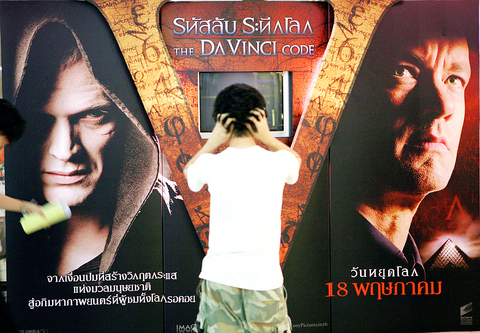Christian leaders in Asia fear the debut today of the movie The Da Vinci Code, based on the premise that Jesus married and fathered children, may sour the image of their religion in the region, where Christianity is overshadowed by Buddhism, Hinduism and Islam.
Christians in India, Malaysia, the Philippines, Singapore, South Korea and Thailand have either protested against the film or expressed concern.
India is temporarily putting the film's release on hold after a flood of complaints. Groups in Thailand persuaded local censors to release an edited version of the film, but the censors later reversed their position. Australian Christians have gone on the offensive, launching ads that challenge the movie's plot in movie theaters. Hong Kong's Catholic church has organized forums to "clarify the facts."

PHOTO: AFP
Christians around the world have criticized The Da Vinci Code, the largely faithful adaptation of the best-selling novel by the same name by Dan Brown.
One of the premises of the movie is that Jesus Christ married Mary Magdalene and fathered children and that his descendants are still alive.
It's considered blasphemy by many Christians, but those in Asia are especially worried, fearful that the movie may spread misinformation about their religion, which is a minority faith in many countries in the region.
"If Jesus Christ had a child and a wife, then Christianity would be destroyed," said Thongchai Pradabchananurat, of the Thailand Protestant Churches Coordinating Committee.
After lobbying by Christian groups, Thailand's censorship board agreed to snip the last 10 minutes of the film, but the movie's maker, Columbia Pictures, appealed successfully yesterday.
In India, Joseph Dias, head of the Catholic Secular Forum, is on a hunger strike in downtown Bombay to protest the movie's planned release in his country, where most of the 1 billion population is Hindu.
After receiving more than 200 complaints, India's Information and Broadcasting Minister Priya Ranjan Dasmunshi said he is going to see the movie for himself, which may delay its scheduled release in the country tomorrow by a day or two.
Authorities in India, Singapore and South Korea have rejected calls to ban the film, saying audiences understand it is fictional.
Philippine movie censor Marissa Laguardia said it was important to preserve free speech in her country.
"Thirty-six countries have already reviewed this film and they have not banned it. So are we just out of the Stone Age?" Laguardia said.
Malaysian Bishop Lim Cheng Ean said the strength of Christian faith alone will counter the movie.
Meanwhile, critics at the Cannes film festival panned the film yesterday, describing it variously as a "dud," "unwieldy" and "plodding."

AGING: As of last month, people aged 65 or older accounted for 20.06 percent of the total population and the number of couples who got married fell by 18,685 from 2024 Taiwan has surpassed South Korea as the country least willing to have children, with an annual crude birthrate of 4.62 per 1,000 people, Ministry of the Interior data showed yesterday. The nation was previously ranked the second-lowest country in terms of total fertility rate, or the average number of children a woman has in her lifetime. However, South Korea’s fertility rate began to recover from 2023, with total fertility rate rising from 0.72 and estimated to reach 0.82 to 0.85 by last year, and the crude birthrate projected at 6.7 per 1,000 people. Japan’s crude birthrate was projected to fall below six,

Conflict with Taiwan could leave China with “massive economic disruption, catastrophic military losses, significant social unrest, and devastating sanctions,” a US think tank said in a report released on Monday. The German Marshall Fund released a report titled If China Attacks Taiwan: The Consequences for China of “Minor Conflict” and “Major War” Scenarios. The report details the “massive” economic, military, social and international costs to China in the event of a minor conflict or major war with Taiwan, estimating that the Chinese People’s Liberation Army (PLA) could sustain losses of more than half of its active-duty ground forces, including 100,000 troops. Understanding Chinese

US President Donald Trump in an interview with the New York Times published on Thursday said that “it’s up to” Chinese President Xi Jinping (習近平) what China does on Taiwan, but that he would be “very unhappy” with a change in the “status quo.” “He [Xi] considers it to be a part of China, and that’s up to him what he’s going to be doing, but I’ve expressed to him that I would be very unhappy if he did that, and I don’t think he’ll do that. I hope he doesn’t do that,” Trump said. Trump made the comments in the context

SELF-DEFENSE: Tokyo has accelerated its spending goal and its defense minister said the nation needs to discuss whether it should develop nuclear-powered submarines China is ramping up objections to what it sees as Japan’s desire to acquire nuclear weapons, despite Tokyo’s longstanding renunciation of such arms, deepening another fissure in the two neighbors’ increasingly tense ties. In what appears to be a concerted effort, China’s foreign and defense ministries issued statements on Thursday condemning alleged remilitarism efforts by Tokyo. The remarks came as two of the country’s top think tanks jointly issued a 29-page report framing actions by “right-wing forces” in Japan as posing a “serious threat” to world peace. While that report did not define “right-wing forces,” the Chinese Ministry of Foreign Affairs was